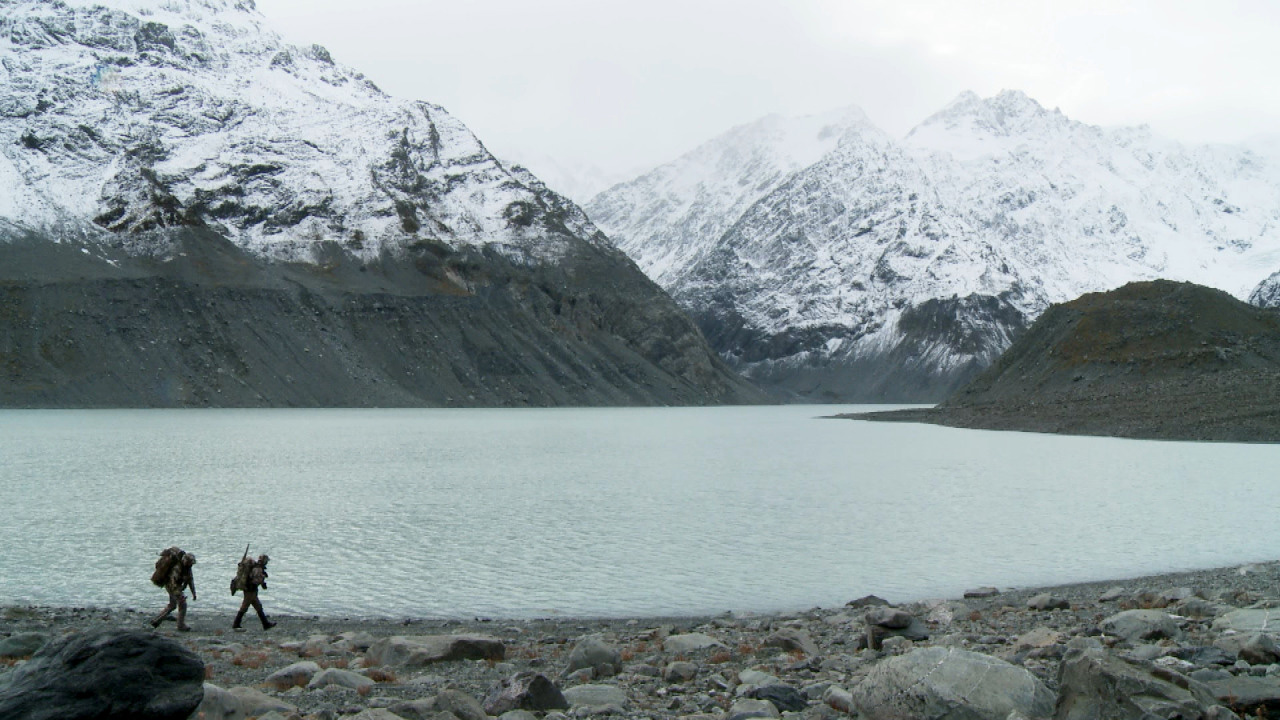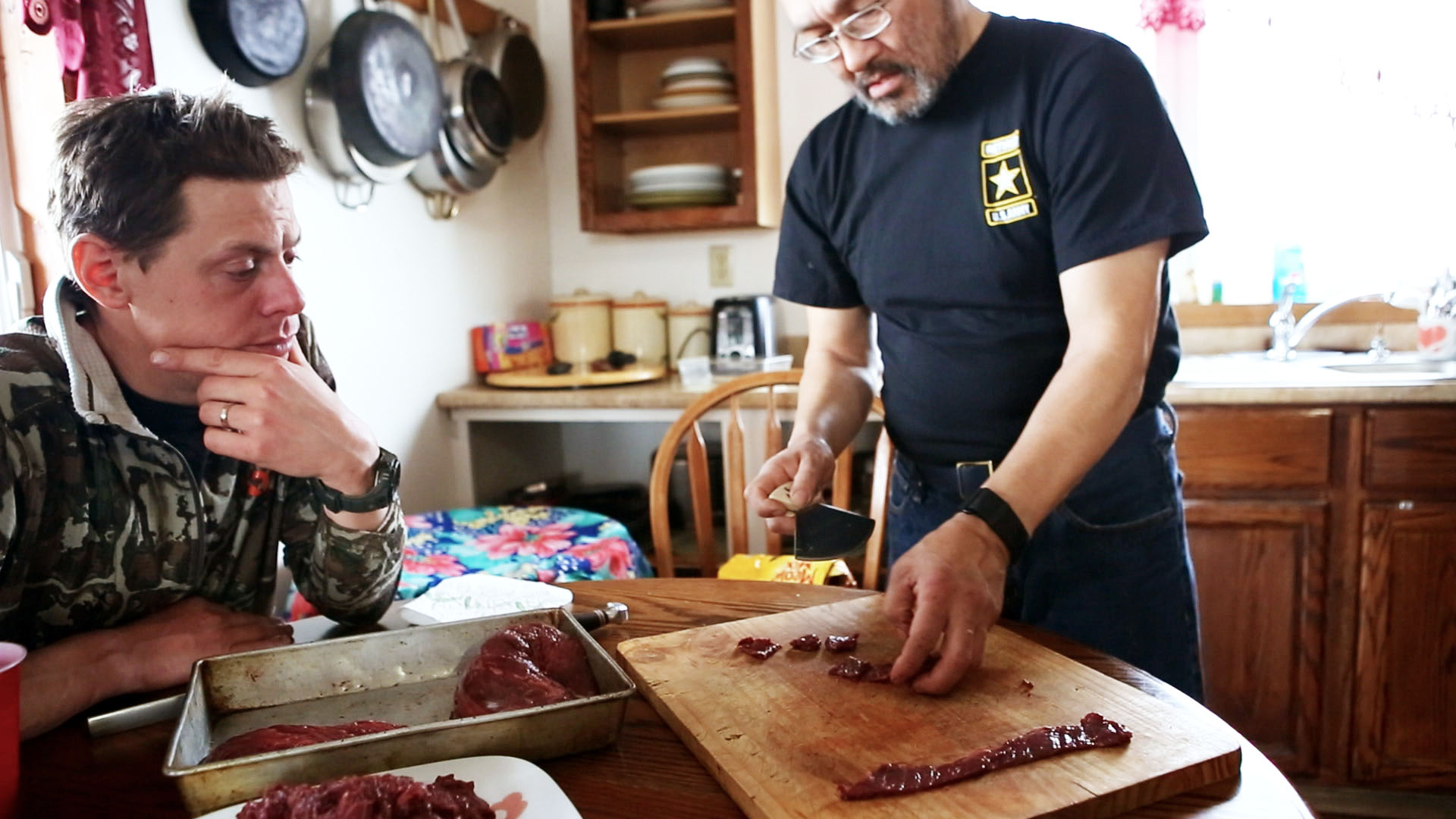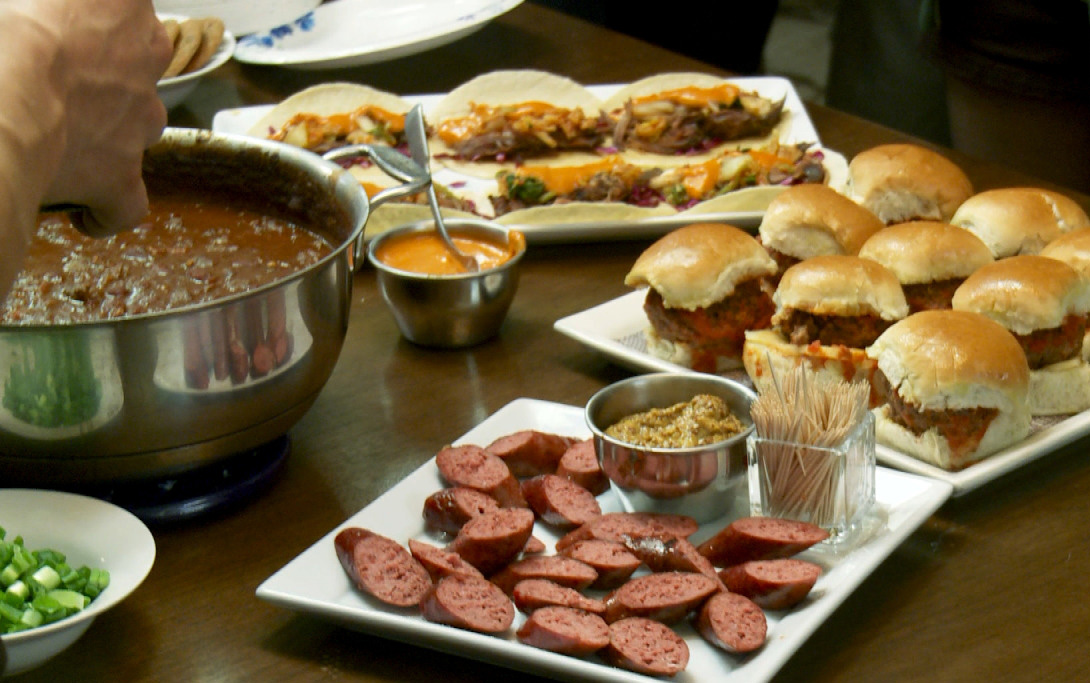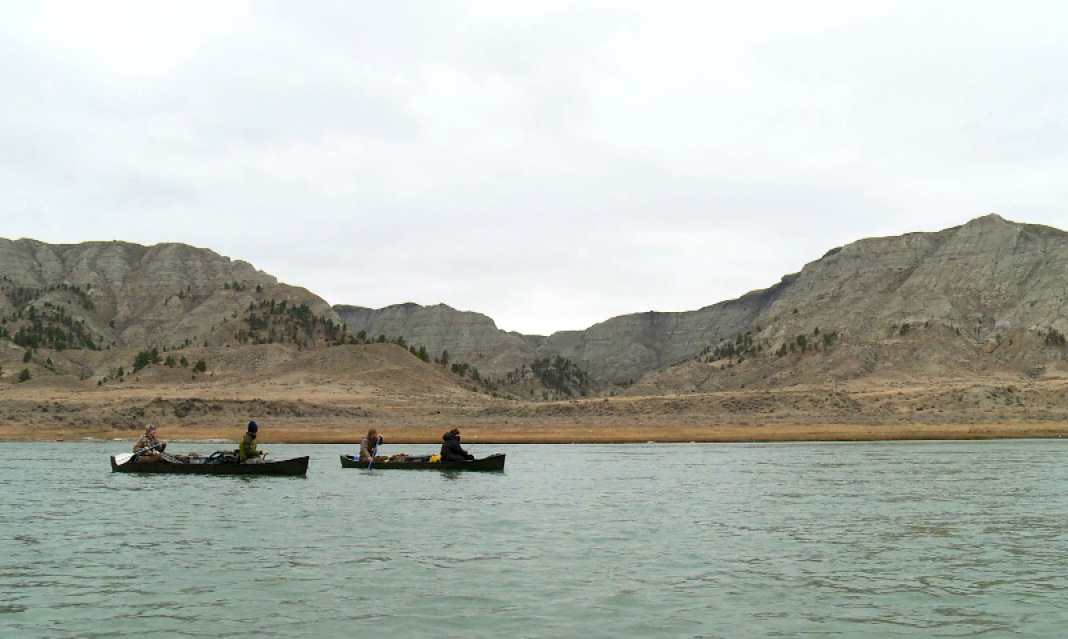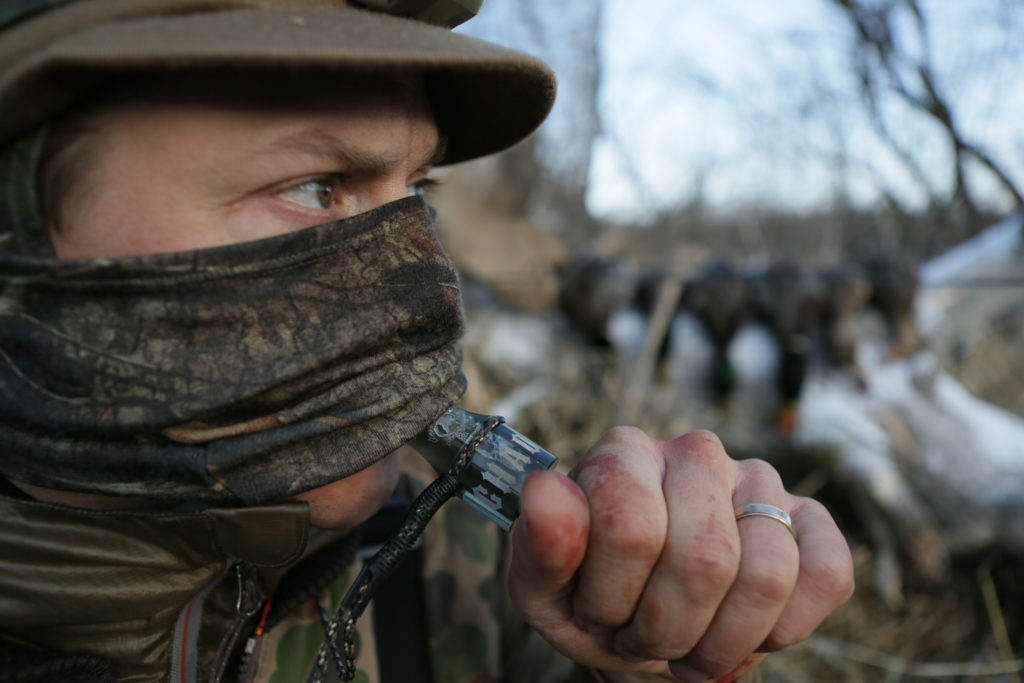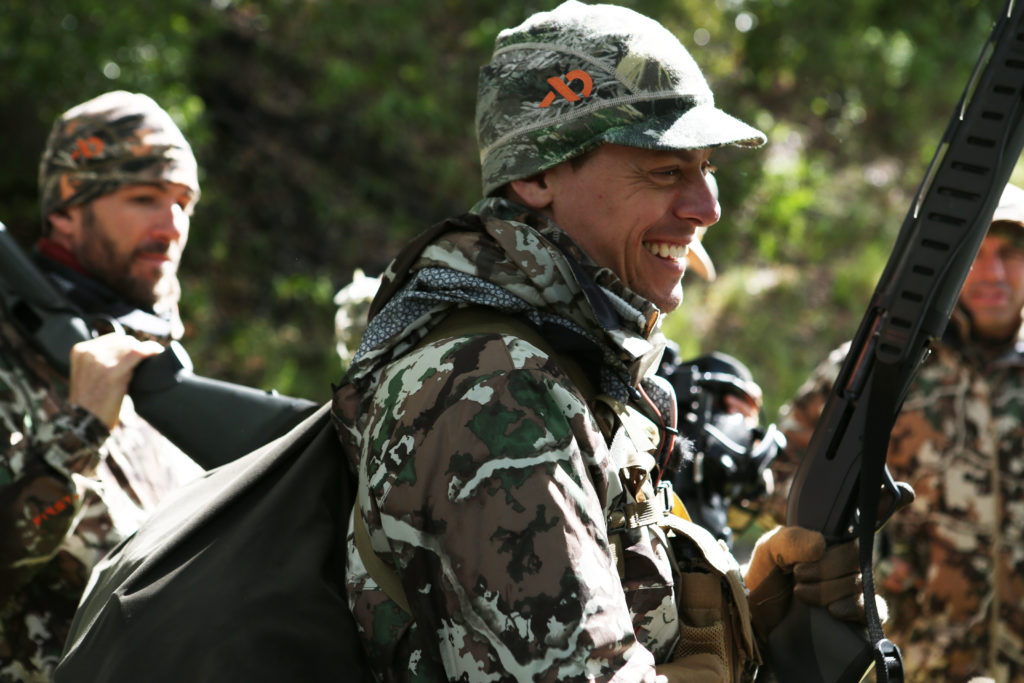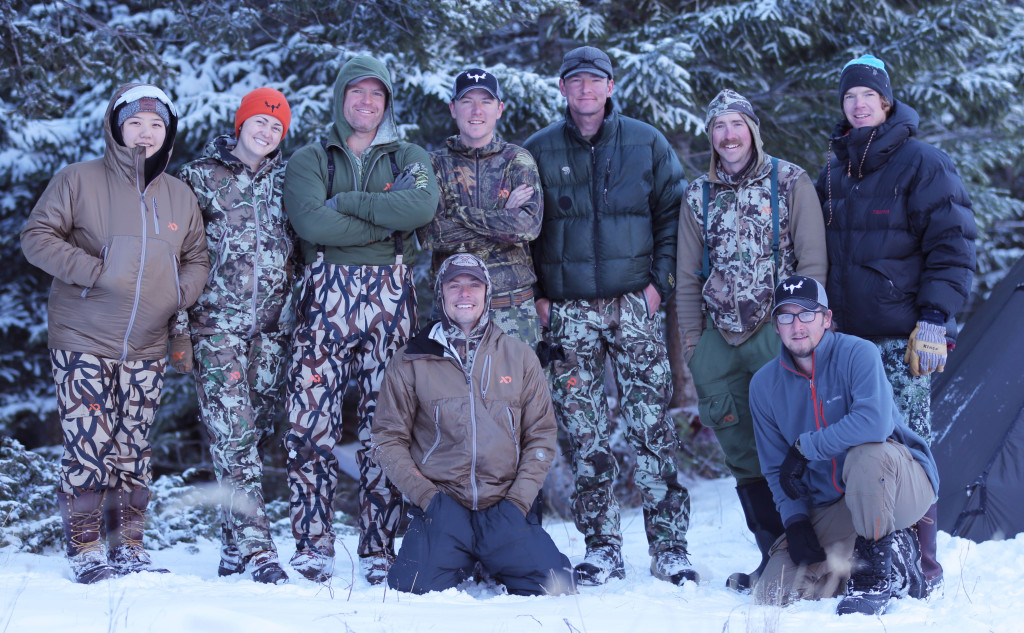Meat – it’s why many of us hunt today and it’s why our ancestors hunted thousands upon thousands of years ago. In most scientific circles, the consumption of meat is held responsible for the growth of our brains and our graduation from piss-ant weakling ape cousins to the nomadic, globe conquering apex predators we eventually became. And although it’s become du jour in some circles to denounce the consumption of meat, there’s no question that the ability to avoid our carnivorous ancestry is a product of modern life, technology and often misplaced ideals that are tough to find outside the First World where daily protein intake is not a forgone conclusion.
At a time when virtually anything labeled natural or organic comes with a premium price tag, hunters can only help but smile when their non-hunting neighbours and work colleagues extol the many benefits of all things grass-fed and free range. We know, we’ve always known and we’re happy you’ve finally decided to join us at the table.
That being said, the organic movement has put one of the many virtues of hunting squarely in the spotlight and many non-hunters that previously frowned upon the “cruelty” or “savagery’ of killing your own meat are giving us the nod for being ahead of the curve.
Within the hunting industry itself, there are a few personalities that are truly leading the charge in sharing this deeply important and spiritual connection to our food. But there is one show and one man in particular that has done more to open the eyes of the uninitiated to the ethical, fair-chase principles behind what many of us consider one of the most spiritual experiences in Nature a human can have.
Steven Rinella, from his books to his groundbreaking show MeatEater , has made hunting and nose-to-tail wild game gourmet cooking popular from New York City to Hollywood. Thanks in large part to Steven’s humour, wit and extensive historical and anatomical knowledge MeatEater is one of the top “reality” shows not just in outdoor media, but arguably across all media combined. And they’ve done it all while having a blast and not taking themselves too seriously along the way.
As a writer, TV host, and now podcaster Steven, his producer Janis Putelis and the rest of the MeatEater crew are as trail blazing (and hilarious) as they come.
Most of our guests will be pretty familiar with you and your show Steven, but I’ll bet many don’t have a full appreciation of the path that brought you to where you are today: writer, backcountry gourmet chef and of course TV personality. Give us the high level overview of how you got into the outdoors industry.
I started getting interested in outdoor writing when I was in high school. I had two things I wanted to do. One, was I wanted to be a commercial fur trapper and when I was 10 that was a dream, like being a mountain man kind of thing. By the time I quit trapping I was 22. I was honestly trying to be a professional fur trapper and, at that time, fur prices were so low. They never really recovered in a way that would make it tenable, so it just wasn’t going to happen.
When I quit trapping, I was 22 and my Plan B had always been that I would become an outdoor writer. I was just trying to find a way to spend a lot of time outside. I went and did an undergraduate degree and then continued on to do a graduate degree, for writing and I started selling stories having to do with hunting and fishing and wild foods. In 2000 I sold my first story to a magazine called Outside. Originally, I was writing for Outside quite a bit. I did stories for Field and Stream and for some smaller hunting and fishing specific publications.
I did magazine work for a few years and published my first book in 2004/2005, then went on to publish the second book called American Buffalo and then got involved in TV – I won’t say it was an accident. It wasn’t something I set out to do, but it was something that came along that I was interested in, so I did it while continuing to write. I started doing television and worked on TV shows and one show was a very short-lived program on the Travel Channel. Coming out of that, I started doing MeatEater and have been doing MeatEater since 2010.
It first aired in 2011, so I’ve been doing that for several years now and I of course continue to write. I just finished two more books – a two volume guide book series called The Complete Guide to Hunting, Butchering and Cooking Wild Game. Volume 1 is big game, Volume 2 is small game. So I guess that was my fourth and fifth books right there.
In the last year I started doing a podcast, which I enjoy doing a great deal. That’s gone well. It’s been a lot of fun doing that.
It’s a great podcast. You guys do a great job and it covers some really interesting topics. I think it’s “must listen” content for anyone who likes discourse or debate around some of these topics, especially the hunting vs. conservation vs. anti-hunting movement.
The question I have is: with your desire to be a commercial fur trapper, where did the “cooking emphasis” come from? Was that always there behind the scenes?
We ate tons of wild game when I was a kid, but it was not necessarily prepared. It was adventurous food, but not prepared in a very adventurous way. Dad had a big deep fryer and we deep fried everything. I mean bullfrogs, suckers, squirrels, rabbits, just about everything. I was brought up with the idea from my Dad that it was fun to try to eat stuff. We preferred to go after fish – a lot of perch, lot of blue gills – very, very good fish, very popular fish, but there was other weird stuff we’d throw at the fire too.
We ate small game – I don’t mean we had some kind of strict wild game diet, but it was just always around us. What it was, to a large measure, was almost like a party kind of thing, like a fun thing. We would have people over and have these little wild game parties – they didn’t call them that, but it was just a thing we did to entertain. People would get together and have a good time, just hanging out, fishing, hunting, so eating food was just always a part of that.
I became really interested in cooking after my fur trapping days. I had just moved out and started living on my own, going to college and that’s when I started developing a much bigger interest in cooking. I was eating game on a daily basis that I was cooking myself and, at that point, I started getting interested in the various things that could be done. It definitely came out of trying to find ways to use stuff that I didn’t know how to use, trying to find ways to cook things that I wasn’t familiar with cooking. I became self-educated on indigenous cooking – how people used to do things, preservation, types of meats and the interest in food definitely solidified out of that. If it wasn’t for hunting and fishing, I would have never become interested in food.
You hear a lot about guys who are chefs and they want to go hunting and fishing because they’re already chefs. To me, it was not that way. I got interested in it because I had a way to get ingredients. I knew how to get ingredients and was curious about what I could do with them. Plus, I’m interested in history.
Were you distinctly interested in using as much of the game animal or fish as possible right from the beginning?
Yeah. I remember in about 1994 sitting around trying to fry a piece of a deer tongue just because we’d killed some deer and had a bunch of people over drinking and eating deer meat. We were just trying to find various parts of the deer that were edible. I’ve always had a problem with waste. I don’t like waste. I eat stuff. I hate watching shit rot in the fridge, like throwing stuff away that has other uses. I think of it in every way, not just food. I just don’t like waste. I like to learn how to do things, so I’ve always been interested in using as much of an animal as possible.
The people and cultures that I have been interested in and respect most have generally been cultures that were really good at getting a lot of use out of things. Say with North American indigenous culture—there’s a tremendous amount of waste in indigenous culture too, but just their idea of using multiple parts of the animals is really interesting. We have this kind of romantic notion of how Plains Indians used all parts of the buffalo and although they didn’t use every part of every buffalo, they used every part of some of them. They had just tremendous knowledge of anatomy and you can just imagine all the experimentation that went into figuring all that stuff out. How they just use all these parts. Rather than being someone who views history as this passive thing you just learn about, I’ve always viewed it as something that can still, in some way, be lived today.
So, just mimicking things that other people did a long time ago. Finding out how they did it, what they did. I was recently talking about the kind of cooking I do, and jokingly called it ‘caveman food.’ I know a lot about that. I know a lot about how to derive protein from things and how to cook things in ways, out in the fields, and I know a lot about what people a long time ago did with stuff. I’m not a great chef, but I have a lot of interest in what you might call or what they used to call ‘gourmet cooking’. I have an interest in ‘fine dining.’ I don’t mean ‘fine dining’ like tables, like necessarily napkins that are nice, but things that are, in a contemporary sense, regarded as high quality food.
One of the unique things you often do in the field is take a “gourmet” ingredient or a piece of the animal that has some interesting historical context, and prepare it in a specific, often true to history manner. It’s definitely a unique approach to wild game cooking.
Let’s shift gears a little, in one of your previous podcast episodes you were discussing terminology as it applies to what hunters call themselves, in particular as it relates to the non-hunting and anti-hunting public. It’s obviously important we emphasize terms like conservationist, but what about environmentalist, naturalist or, of course, simply hunter – what term would you use to describe yourself?
It depends on who I’m trying to be clear to and it depends on who I’m talking to, I guess. A lot of people have no distinction. They don’t know what the term ‘conservationist’ is, for example. People from outside the hunting world don’t really know what conservationism is. I think in some ways—and I say this a little bit tongue in cheek—but sometimes I think a conservationist is a like an environmentalist with a gun. It’s not terribly untrue.
No, it’s not.
There is a bit of reluctance on the part of hunters to use the word ‘environmentalist’ because I think environmentalists in some ways have the connotation of basically locking people out, making animals no touch. When an environmentalist goes on vacation, they like to go to a National Park where you can’t even pick up a chunk of bone. A conservationist goes on vacation, he likes to experience the wilderness, but in a place he might someday have an eye towards doing a little hunting on it.
I think hunter-conservationist is how I view myself. I guess I’m more radical. If you were going to average it out, in some way, on a number line where the average American hunter falls in terms of environmental issues, and let’s say you calibrated it so the average was a ‘5’, I would probably be a ‘9’.
Someone recently asked me, or posed the question, “If you were a Wildlife Czar, in the US and you had absolute control, what would you do?” I would get together a bunch of ecologists and a bunch of wildlife biologists and I would have them come up with a good working definition of what is wilderness. I would have them do it in a way that they would not be overlooking remnant patches of wilderness that exist in the Eastern US and in the South Eastern US. A good definition that holds is areas of Appalachia, areas of the Adirondacks, marshlands in Florida, estuary habitats in the North East and, once we came up with what this working definition of ‘wilderness’ was, we would draw a map and we would isolate those places and put a name to them and not mess with them ever!
When you say ‘not mess with them’ do you mean no hunting, no fishing, or simply no resource extraction or development?
No, I mean no development. Hunting and fishing as much as we can sustain hunting and fishing, but no destructive practices. No non-renewable activities. I would take those places— we already have a tool in the US called Designated Wilderness. I would like to see that those places are safe from development, that’s where I’m coming from. I understand the argument against it – the argument against it generally comes down to jobs, the economy and jobs. When you come up with an issue e.g., “We’re going to put a mine here,” it’s always we’re weighing jobs against something that’s harder to define, which is this wilderness matter. I get all that. I could articulate the other side of that argument all day long. I could be a lobbyist. I understand the arguments enough that I could become a lobbyist for big oil. I’d be able to bullshit my way through that, no problem. I understand every argument they have.
But, with that said, I still think that we need to save the wilderness that we have left. It will only become more valuable as everything else gets destroyed.
So maybe I’m a radical. You know what, I’ll say I’m a radical conservationist. Like a radical environmentalist, but different. I’m a radical environmentalist with lots of good sense.
I don’t think we should be damaging habitat.
I couldn’t agree more.
Moving on to the next question – one of the things that concerns me in the hunting community is this downward trend in the willingness to debate topics that matter. Whether that’s utilisation of certain technologies for hunting, the increasing popularity of long-range hunting or the trophy vs. meat hunter question to name a few – there seems to be less public or open debate and discourse regarding topics that are highly important both internally and externally from a public relations standpoint. Some publications border on censorship of their writers. Would you agree with this sentiment?
I think it depends on the topic. I can’t think of a publication yet that hasn’t taken a stab at the practicality and ethics of long range shooting for instance. Or with drones, many States are getting way out ahead of the drone issue. The conservative States are getting out ahead of the drone issue: Alaska – can’t touch it, Montana same.
So I don’t think there’s a reluctance to talk about emerging technologies. It’s tricky, though, to legislate some of these emerging technologies or hunting techniques that are a by-product of emerging technologies. As an example, how are you going to legislate shooting distance?
Right.
I’ve got a friend who is a Marine Corps sniper instructor. At 300 yards that dude shoots far better than most everybody I know at 75 yards.
Right. And yes the long range discussion is something I think is really interesting. What I mean by discourse and debate is, it’s one thing to come out and say it’s “wrong” or “no one should be doing it without XYZ training or equipment or technology” but in my opinion there’s been minimal actual discourse on how to tackle what is a relatively complex topic with an unbelievable number of variables at play.
But, what is “long range”? You’ve got to define “far” or “too far”. What’s far?
Exactly! And I think that discussion hasn’t necessarily been had beyond a superficial level. It is an arbitrary number. For some hunters it would likely be 300 yards, but for your ex-Marine buddy that’s a gimme.
I understand what you’re saying. I guess my exposure has been different, where I feel like it’s talked about all the time. I feel like it’s an open discussion – what is too far? We talk about it at Western Hunter – those guys weighed in and I feel like I see it everywhere. People asking, how do you define “too far?”
Let’s move off the long range example as I didn’t want to get bogged down on that specific topic. We can agree to disagree on the depth of the debate on that specific example and regardless it’s only one of many examples we could use. So to come back to the original question, you don’t feel that there has been, in comparison to say editorial positions and opinions from decades ago, a downward trend in debate and discourse within the hunting community?
Not in regards to technology, at least not that I’ve seen. I think that there’s a school of thought that goes: you should never draw any distinctions between hunters or never criticize any other hunter’s practices because that would somehow make us weaker. I think that’s something people talk about. I’ve heard that. I understand when people say that and I understand where they’re coming from. I don’t agree with it, but I understand where they’re coming from.
There is however a high level of censorship within the hunting industry around debating the use of certain types of firearms and I know that people who question certain aspects of gun ownership and the Second Amendment here in the US, risk destroying their careers for it. I also think that a lot of guys secretly hunt high wire, secretly hunt fenced game and they don’t like to get called out because it’s something they do and don’t publicize it, but they don’t want to hear it criticized.
Excellent points all around, let’s move on to bears.
So from a bear hunting standpoint you’ve obviously spoken tonnes about bear hunting. When did you start black bear hunting?
I started bear hunting in Michigan when my brothers each drew a bear tag for the first time. Bears were just coming back in Michigan from pretty low levels. There’s always been bears in Michigan but, during my teen years, bears were really expanding. They’re expanding still now but they started a big expansion in Michigan, recolonizing old territories that used to have bears where they’d been extricated from, which is the kind of story you see in many, many areas. It’s taken them 150 years to figure out how to get along with people, but they’re figuring it out.
My one brother drew a bear tag in 1992, I think, and I helped him get everything set-up like the baits and his stands but I didn’t actually hunt with him. Then my other brother, shortly after that, drew a bear tag and I helped him run some baits as well, but again I didn’t hunt with them. I didn’t kill my first bear until 1996 or 1997. I’ve never killed a bear with bait, but the first bears I ever skinned and butchered and ate, were baited bears in Michigan.
My old man also did a fair bit of bear hunting. He’s killed some nice bears. He killed a Pope and Young bear with his bow out of a tree. He killed a handful of other bears, they used to go up in Ontario, and catch suckers and hang suckers up. They didn’t so much pre-bait, they’d just hang gunny sacks of suckers up along bear trails and then the bear would come along and they’d poke at them with their bows. This is hunting recurves. He killed a bear at 5 yards with his recurves. Big bear.
Wow! That’s up close.
I’ve got a picture here on my desk, I’ve got a picture of him with a Pope and Young black bear that he killed with dogs in Colorado. This is way before I was born.
And I’ve heard you mention before bears are one of those animals you have a certain level of conflict, not conflict in an adversarial sense, but an internal conflict around hunting them. On the one hand, love the meat, love hunting them but on the other, you have a certain affinity for them.
Yeah, there are a couple of animals like that. When I was trapping, the coolest thing in my mind was the time I caught my first river otter, I view that as being sort of the apex of my trapping career. It was my proudest achievement by far. But, it was awful sad for me, too, because I had just really come to admire river otters. I just liked watching them so much. And bears? I can’t tell you this in an empirical way, but I feel that bears are just on a way different trip. I think a bear wakes up every day a little bit different than he was the day before.
Interesting.
I can’t say the same thing about elk and moose and deer. I think an elk wakes up every day just pretty much the same critter as he was the day before, but I feel like a bear, every day, processes some little piece of information in some way. But man, I love hunting bears. What might be my favourite thing now is to take other people bear hunting and be there. This Spring I hunted bears. I had no intention of shooting a bear, but my buddy really wanted to get a nice bear, so we went to hunt up in my shack in South East Alaska. He kills a big bear, everyone is happy. I was happy for him. It was fun to watch him get a nice bear, it was his second bear, but his first nice bear. It was great, man. Right now I’m already trying to line up more people to take bear hunting. It’s like, how many bear hides do you need?
That’s great, bear hunting is a unique experience and one I think many hunters would enjoy far more than they think.
Let’s move on to MeatEater: How do you guys go about choosing your quarry and/or location? Take us through the process there.
There is no formal process, it’s just a matrix of how excited we are about it, whether we’ve done it before, when it happens, availability, is it do it now or never do it? Can we sit on it? If we’ve been cold and wet a long time, all of a sudden warm and dry things start feeling really great. There’s a bit of that. There is no system. It’s just sitting on them and looking at a massive amount of variables and trying to do it. A lot of it is, “Well, what have we done lately? Is it something we can return to later?” Then there are certain things that are so seasonal, like Dall sheep. There’s a 25 day window if that’s going to happen, whereas if you’re going to go hunt in Hawaii, it’s 365 days of the year. So the 365 days a year things tend to get bumped every year because you feel like you can go as soon as you want to go.
Of course.
And then the tags obviously have an effect, like a limited draw tag will jump way up on the list. If you draw limited draw tag, well, then you’re going to go. There’s no putting it off. It’s a lot of things, it’s just like crafting the show. Just thinking about what we’ve done in the past and what we want to do in the future. The show definitely evolves over time, but it doesn’t evolve in a quick way. In my head it might just seem to evolve, but a viewer might not realize that, or agree with that, and think it’s pretty much the same show. In my mind, it feels like an evolution is going on all the time. It’s probably just something I think of to keep things fresh or to not be stagnant. I never worry about the show down the line. I never worry about what’s going to happen with the show. I think as long as we want to keep doing it, we’ll keep making it. I used to worry about running out of stuff to film and then I realized we’re never going to run out of awesome experiences and topics.
You must spend a fair chunk of time and resources going through the whole tag application side of things then?
Yeah, that’s a big part of every winter, doing the apps. But, the main guy I talk to about what we’re going to do is Janis Putelis—basically the two of us make all the decisions, me and Janis. I talk to Janis when we’re not together at least four/five days a week.
Right.
Every conversation has some part of it where we talk about what we’re going to do.
As an aside, is this where you want to plug Janis’ t-shirts for our readers? (Editor’s note: this is a half joke – Janis’ tees are damned cool and you should check them out but it’s also a running joke on the Meateater podcast).
Yeah. On the subject of Janis, go buy one of Janis’ “Hunt2Eat” t-shirts.
They’re damned nice t-shirts. I’ll make sure we publish that link!
What would you say has been your craziest or one of the most eye-opening experiences you’ve had while filming?
Okay, this is a bold statement – I’ve eaten just a tremendous amount of interesting things. Being with the Chumani Indians in Bolivia and going out monkey hunting and then cooking and eating the monkey was a very eye-opening experience. The food stuff has been a great and crazy part of all this. Another eye-opening thing that I’ve experienced, and I marvel on all the time, is trying to predict or figure out what kind of person can handle hunting and hiking in the mountains and what kind of people can’t. It’s really perplexing. I get guys that say “Oh I ran a marathon recently, I’ll be fine” and they just get killed. Then there are some people who just smoke it. Obviously a level of physical fitness is required and you can look at someone and tell if the guy is going to make it, but I just can’t figure out what it is that really makes or breaks those that truly excel and those that just get by. What makes someone capable of mountain hunting and what makes someone not? I think it’s attitude to a huge degree but I can’t figure out just exactly what it is.
When I’m in town, I work out with a trainer and he was telling me about this thing called the SAID principle. Specific Adaptations for Imposed Demands. What we’re talking about is how so much exercise—I mention this on the podcasts—so much exercise just makes you better at doing that given exercise. My brother was joking about CrossFit. Yeah, you CrossFit and it just makes you good at doing CrossFit. What is it that makes it so you can hike in the mountains? Basically the only thing that makes you good at hiking in the mountains is hiking in the mountains! This is just something that’s baffled me because when I look at crew members and guests there’s no formula. Good guests who come on the show and crew members will be hired to work on the show will invariably tell me they’re all set, they’re ready to roll and so often I’m just shocked at how unready they are. It really makes me wonder, like, how? What is it? Why is it so hard for people?
This is a great point and one of the main reasons we have a dedicated column on mountain fitness and preparation. The conventional approach to fitness, like you said, doesn’t necessarily transfer to the field. I read stuff all the time that makes me cringe, stuff like “Make sure you spend time on the StairMaster”, or “If you live in the city, walk stairs with your pack.” Well that’s not side hilling and that’s not shale, or mud or a boulder field. That’s not to say it’s bad advice, something is better than nothing, but the challenge is that machines and controlled environments (aka a gym) don’t directly transfer to the mountains without a serious amount of creativity applied to problem. Of course there are people who despite all this, just get it done.
There are certain guys who are just going to go. They may not be prepped, but they’re just going to go because they have the mental fortitude. They’re the people who are just never going to say quit and are incapable of saying quit.
It’s just something that I’ve been exposed to and pondered often. Weird food and an interesting study of physical/mental fitness. There are two things I always tell people when they are going to come on their first mountain hunt: “Get very good boots now and break them in,” and then, “Get in good shape.” No one ever does those two things. They just can’t picture it. “Oh, no. I got them. The guy at the boot store said they’re already broken in.” Just bad advice. Or, “I wore them back and forth to work.” No one ever, ever does the two things you tell them to do.
One is hard – like get in good shape and how do you define that? The other one is not that hard. Get your boots and break them in. People just don’t. They won’t. They will not and I don’t know why! It’s a mystery.
I couldn’t agree more, you’re spot on.
Ok, let’s move on to some rapid fire questions. Bucket list hunt – what’s at the top of the list?
I want to hunt Stone Sheep real bad, but not so bad that I’m quite ready to do it the way that I’ll probably have to do it.
Meaning guided?
I wished I lived in an alternate universe where I could hunt unguided Stone Sheep or just hunt Stone Sheep with a friend. So some day, I think I’ll just do it and go on a guided Stone Sheep hunt.
You’ve just got to move that office a couple of hours up the I5, then you’re all set!
If you had to choose between hunting or fishing for the rest of your life, what would it be?
Can death be in there?
Sure, you can choose death over having to choose. So death it is then?
Yeah, I think I’d choose death over having to choose.
What’s one book you’ve gifted or recommended the most, let’s say, in the past decade? It doesn’t have to be a hunting book either.
The book I recommend the most in just general life – there have been three books I recommend the most. I always recommend: Son of the Morning Star by Evan S Connell, Arctic Dreams by Barry Lopez, and Boone by Daniel Morgan. I always find myself trying to get people who like the outdoors to read those books.
Excellent.
BLAZING TRAIL IS BROUGHT TO YOU BY THE WILD SHEEP FOUNDATION


